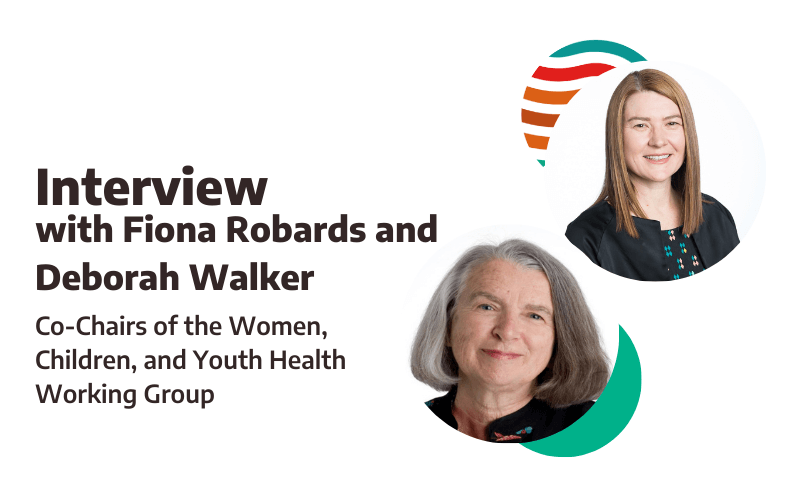The Working Group of Women, Children, and Youth Health is integral to the World Federation of Public Health Associations (WFPHA). The group is dedicated to advancing public health efforts that support the well-being of women, children, and young people globally. They focus on advocacy, research, and policy development, emphasizing vulnerable populations.
We had the pleasure of speaking with the Working Group’s co-chairs, Dr. Fiona Robards and Deborah Walker, to learn more about their motivations, current activities, and vision for the future.
Please introduce yourselves.
Fiona Robards: I’m Dr. Fiona Robards, co-chair of the World Federation of Public Health Associations Women, Children, and Youth Health Working Group, and I’m an academic at the University of Sydney in Australia.
Deborah Walker: I’m Deborah Klein Walker, co-chair of the World Federation Women, Children, and Youth Health Working Group. I’m an adjunct professor at Tufts University and the Boston School of Public Health in Boston. I’m also the designated liaison between the American Public Health Association and the World Federation.
What motivated you to pursue a career in the public health sector?
Fiona Robards: I’ve always been interested in the big picture. I started as a psychologist, managed health services for homeless young people, and then moved into policy and academia. I’m interested in preventing health issues and achieving health equity, especially for women, children, and youth. We know that women, children, and young people continue to die at high rates from preventable causes, and child well-being and survival are directly related to the health of mothers. Young people are another neglected population, most living in lower- and middle-income countries.
Deborah Walker: It’s interesting because my reasons for joining public health are similar to Fiona’s. I was trained as a psychologist and discovered public health, which I define as the practice of social justice, improving the health of populations every day. Our working group advocates for interventions to improve the health of women, children, and young people. Universal health care, equity, and health as basic human rights are critical issues for these groups. I have worked in the public health field with a focus on maternal and child health for over 40 years, in academia, public health practice at local, state, and federal levels in the United States, and as a researcher and vice president at a global consulting firm.
Tell me how long you’ve been associated with the World Federation of Public Health Associations.
Fiona Robards: I joined the Women, Children, and Youth Working Group in 2022 and became its co-chair last year, in 2023.
Deborah Walker: I’ve been associated with the World Federation of Public Health since I was the President of the American Public Health Association. I joined actively in 2010. I was a member of the Governing Council at one point, the Advisory Committee, and the Policy Committee since I joined in 2010. I became the chair of the Women, Children, and Youth Working Group in July 2020.
Could you elaborate on your working group’s current activities and share your vision and plans for the future?
Fiona Robards: Our working group has four goals: to advocate for equity in global policies to improve the health of women, children, and youth; to advance public health practice, education, training, and research related to these groups; to expand and strengthen partnerships; and to promote and support the advancement of women, children, and youth health in strong member associations. We’re currently focusing on policy development. We recently developed a new policy on children and young people’s health and rights, and we’re working on a range of new policies, including one on youth mental health, a call to action on climate action for maternal, newborn, and child health populations, breastfeeding, preconception and fertility, and youth health.
Deborah Walker: We, for example, have difficulty finding a time for our meetings that will incorporate all the time zones of the world, especially since Fiona and I are in two opposite extremes of the globe, Australia and the United States. We’ve settled on a time that seems to work for us and all the other time zones. Another challenge is finding resources so we can meet in person. We are especially looking for funds to send a core group of us to the next World Congress in South Africa.
How do the working group’s activities align with and support implementing the WFPHA strategic plan?
Deborah Walker: The mission of the World Federation of Public Health Associations is to protect people and the planet, prevent diseases, and promote peace, health, and well-being. The Women, Children, and Youth Working Group focuses on addressing health inequity for these populations, emphasizing the most vulnerable groups and providing a forum for developing resolutions for actions for the World Federation and its member public health associations. The World Federation’s goals that we align with and support include advocating for peace, sustainable health equity, and global policies; contributing to systems change; strengthening and democratizing global health governance; advancing public health knowledge, education, practice, and research; growing new and maintaining existing partnerships; supporting and enhancing member organizations; and building an effective, efficient, responsive, and sustainable World Federation of Public Health Associations.
Please tell me in what ways being part of the WFPHA and its network has enhanced the activities of your working group.
Fiona Robards: We collaborate with two working groups, the Tobacco Working Group and the Oral Health Working Group, on research projects. One project explores young people’s views of the tobacco endgame, and another explores international and national frameworks, guidelines, recommendations, and strategies for maternal tobacco prevention and cessation. We’re also developing a youth mental health policy and will seek feedback from the Mental Health Working Group.
How does being part of the WFPHA strengthen your group’s advocacy for the health issues of women, children, and youth?
Deborah Walker: The World Federation of Public Health Associations provides a global platform for advocacy to promote the health of women, children, and youth. We have used this platform to reach out to public and regional public health associations to build our membership. Recently, 32 new members joined from a wide range of countries on all continents. The new members have expressed interest in working on our various policies under development, which is fabulous to see.
What strategies does the group use to form effective partnerships for advancing health outcomes for women, children, and youth?
Fiona Robards: If we’re to end preventable maternal, child, and youth deaths and improve the quality of life for all the world’s people, then, of course, the voices from these population groups must be heard and engaged. We learn from our colleagues around the globe about culturally appropriate and effective interventions.
What benefits has your group gained from WFPHA’s global partnerships and collaborative opportunities?
Deborah Walker: The World Federation of Public Health Associations’ collaborative opportunities have enabled us to develop research partnerships and policies and grow our membership. Frankly, we are beginning to see the impact of the World Federation’s partnerships on our work.
Do you have any accomplishments right now that you’re proud of?
Deborah Walker: We were fortunate to have an intern from the World Federation who developed a study on all maternal and child health policies from the different member associations. Fiona took the lead on the article to be published in the Journal of Public Health Policy. We found very few policies on women, children, and youth in those public health associations. That is why we are focused on developing policies for the World Federation that member public health associations can adopt. When this population is almost half of the world, and if women and children do well, we all do.
Conclusion
The WFPHA Working Group on Women, Children, and Youth Health is dedicated to improving global health outcomes for these vulnerable populations through advocacy, policy development, and partnerships. Under the leadership of co-chairs Fiona Robards and Deborah Walker, the group continues to drive forward initiatives that emphasize equity, health rights, and culturally relevant interventions. Their work is essential in shaping a healthier future for women, children, and youth worldwide, ensuring their voices are heard and needs addressed globally.
Working Group members:
Adebayo Amao, Professor and Consultant Community Physician Adesola Olumide, University of Ibadan Nigeria
Alix Woldring, Centre for Population Health, NSW Ministry of Health, PHA of Australia
Dr. Amie Steel, University of Technology Sydney, PHA of Australia
Anastesia Araba Tawiah, WFPHA Intern, PHA of Australia
Ayokunle Kajero, Society for Adolescents and Young People’s Health in Nigeria (SAYPHIN), Nigeria
Dr. Claire Copperstone, Malta Association of Public Health Medicine, Faculty of Health Sciences, University of Malta
Danielle Schoenaker, UK
Deborah Klein Walker, EdD, Boston University, American PHA, USA
Professor Debra Jackson, London School of Hygiene & Tropical Medicine, UK
Evelyn Cherow, MA, MPA, American PHA, USA
Professor Fatema Ashraf, Public Health Foundation of Bangladesh
Dr. Fiona Robards, University of Sydney, PHA of Australia
Dr. Funmilayo Morebise, Society for Adolescent and Youth Health in Nigeria (SAYPHIN, Nigeria
Haley Myers, MPH, American PHA, USA
Dr. Hyewon Lee, Korea
Jasmine Lykissas, Communications at the PHA of Australia
Justine Salisbury, Centre for Population Health, NSW Ministry of Health, PHA of Australia
Professor Mitike Molla Sisay, Ethiopian PHA, Ethiopia
Nabankema Victoria, MPH, Uganda National Association of Community Occupational Health, Uganda
Narila Mutia, Assistant Professor, Indonesia Public Health Association/ IAKMI, Indonesia
Olaniyan Halimat, Society for Adolescent and Youth Health in Nigeria (SAYPHIN), Nigeria
Dr. Oliver-Williams, Clare, Global Violence Prevention SIG Co-Chair, UK
Dr. Olujide Arije, Institute of Public Health, Obafemi Awolowo University, Nigeria
Onyinye Gloria, Society for Adolescent and Youth Health in Nigeria (SAYPHIN), Nigeria
Owolabi Tomiwa, PhD candidate, Institute of Child Health, University College Hospital, Ibadan, Nigeria
Rachel Barbabela, MPH, Child and Adolescent Psychiatrist, Portugal
Dr. Tope.O. Durojaiye, Society for Public Health Professionals in Nigeria (SPHPN), Society for Adolescent and Young People’s Health in Nigeria (SAYPHIN), Nigeria
Vina Hulamm, USA
Yemisrach Shiferaw, Ethiopian PHA, Ethiopia
![Key Strategies for Overcoming Vaccine Hesitancy among Healthcare Workers [Report]](https://www.wfpha.org/wp-content/uploads/2024/11/vaccine-hesitancy-among-healthcare-workers-report.png)











Recent Comments